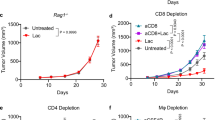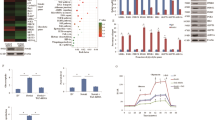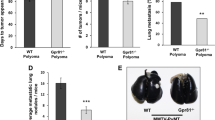Abstract
The clinical success of immunotherapy that inhibits the negative immune regulatory pathway programmed cell death protein 1/PD-1 ligand (PD-1/PD-L1) has initiated a new era in the treatment of metastatic cancer. PD-L1 expression is upregulated in many solid tumors including lung cancer and functions predominantly in lactate-enriched tumor microenvironments. Here, we provided evidence for PD-L1 induction in response to lactate stimulation in lung cancer cells. Lactate-induced PD-L1 induction was mediated by its receptor GPR81. The silencing of GPR81 signaling in lung cancer cells resulted in a decrease in PD-L1 protein levels and functional inactivation of PD-L1 promoter activity. In addition, GPR81-mediated upregulation of PD-L1 in glucose-stimulated lung cancer cells that recapitulates the enhanced glycolysis in vivo was dependent on lactate dehydrogenase A (LDHA). We also demonstrated that activation of GPR81 decreases intracellular cAMP levels and inhibits protein kinase A (PKA) activity, leading to activation of the transcriptional coactivator TAZ. Interaction of TAZ with the transcription factor TEAD was essential for TAZ activation of PD-L1 and induction of its expression. Furthermore, we found that lactate-induced activation of PD-L1 in tumor cells led to reduced production of interferon-γ and induction of apoptosis of cocultured Jurkat T-cell leukemia cells. Our findings reveal an unexpected role of lactate in contributing to tumor cell protection from cytotoxic T-cell targeting and establishes a direct connection between tumor cell metabolic reprograming and tumor evasion from the immune response.
This is a preview of subscription content, access via your institution
Access options
Subscribe to this journal
Receive 50 print issues and online access
$259.00 per year
only $5.18 per issue
Buy this article
- Purchase on Springer Link
- Instant access to full article PDF
Prices may be subject to local taxes which are calculated during checkout







Similar content being viewed by others
References
Topalian SL, Drake CG, Pardoll DM . Immune checkpoint blockade: a common denominator approach to cancer therapy. Cancer Cell 2015; 27: 450–461.
Palucka AK, Coussens LM . The basis of oncoimmunology. Cell 2016; 164: 1233–1247.
Topalian SL, Taube JM, Anders RA, Pardoll DM . Mechanism-driven biomarkers to guide immune checkpoint blockade in cancer therapy. Nat Rev Cancer 2016; 16: 275–287.
Pauken KE, Wherry EJ . Overcoming T cell exhaustion in infection and cancer. Trends Immunol 2015; 36: 265–276.
Topalian SL, Sznol M, McDermott DF, Kluger HM, Carvajal RD, Sharfman WH et al. Survival, durable tumor remission, and long-term safety in patients with advanced melanoma receiving nivolumab. J Clin Oncol 2014; 32: 1020–1030.
Garon EB, Rizvi NA, Hui R, Leighl N, Balmanoukian AS, Eder JP et al. Pembrolizumab for the treatment of non-small-cell lung cancer. N Engl J Med 2015; 372: 2018–2028.
Motzer RJ, Rini BI, McDermott DF, Redman BG, Kuzel TM, Harrison MR et al. Nivolumab for metastatic renal cell carcinoma: results of a randomized phase II trial. J Clin Oncol 2015; 33: 1430–1437.
Lipson EJ, Forde PM, Hammers HJ, Emens LA, Taube JM, Topalian SL . Antagonists of PD-1 and PD-L1 in cancer treatment. Semin Oncol 2015; 42: 587–600.
Boroughs LK, DeBerardinis RJ . Metabolic pathways promoting cancer cell survival and growth. Nat Cell Biol 2015; 17: 351–359.
Walenta S, Schroeder T, Mueller-Klieser W . Lactate in solid malignant tumors: potential basis of a metabolic classification in clinical oncology. Curr Med Chem 2004; 11: 2195–2204.
Walenta S, Mueller-Klieser WF . Lactate: mirror and motor of tumor malignancy. Semin Radiat Oncol 2004; 14: 267–274.
Fischer K, Hoffmann P, Voelkl S, Meidenbauer N, Ammer J, Edinger M et al. Inhibitory effect of tumor cell-derived lactic acid on human T cells. Blood 2007; 109: 3812–3819.
Lu H, Forbes RA, Verma A . Hypoxia-inducible factor 1 activation by aerobic glycolysis implicates the Warburg effect in carcinogenesis. J Biol Chem 2002; 277: 23111–23115.
Vegran F, Boidot R, Michiels C, Sonveaux P, Feron O . Lactate influx through the endothelial cell monocarboxylate transporter MCT1 supports an NF-kappaB/IL-8 pathway that drives tumor angiogenesis. Cancer Res 2011; 71: 2550–2560.
Hirschhaeuser F, Sattler UG, Mueller-Klieser W . Lactate: a metabolic key player in cancer. Cancer Res 2011; 71: 6921–6925.
Kuei C, Yu J, Zhu J, Wu J, Zhang L, Shih A et al. Study of GPR81, the lactate receptor, from distant species identifies residues and motifs critical for GPR81 functions. Mol Pharmacol 2011; 80: 848–858.
Liu C, Wu J, Zhu J, Kuei C, Yu J, Shelton J et al. Lactate inhibits lipolysis in fat cells through activation of an orphan G-protein-coupled receptor, GPR81. J Biol Chem 2009; 284: 2811–2822.
Roland CL, Arumugam T, Deng D, Liu SH, Philip B, Gomez S et al. Cell surface lactate receptor GPR81 is crucial for cancer cell survival. Cancer Res 2014; 74: 5301–5310.
Zanconato F, Cordenonsi M, Piccolo S . YAP/TAZ at the roots of cancer. Cancer Cell 2016; 29: 783–803.
Zhou Y, Huang T, Cheng AS, Yu J, Kang W, To KF . The TEAD family and its oncogenic role in promoting tumorigenesis. Int J Mol Sci 2016; 17: pii E138.
Zhou Z, Hao Y, Liu N, Raptis L, Tsao MS, Yang X . TAZ is a novel oncogene in non-small cell lung cancer. Oncogene 2011; 30: 2181–2186.
Yu FX, Zhao B, Panupinthu N, Jewell JL, Lian I, Wang LH et al. Regulation of the Hippo-YAP pathway by G-protein-coupled receptor signaling. Cell 2012; 150: 780–791.
Yu FX, Zhang Y, Park HW, Jewell JL, Chen Q, Deng Y et al. Protein kinase A activates the Hippo pathway to modulate cell proliferation and differentiation. Genes Dev 2013; 27: 1223–1232.
Li XB, Gu JD, Zhou QH . Review of aerobic glycolysis and its key enzymes - new targets for lung cancer therapy. Thorac Cancer 2015; 6: 17–24.
Shimomura T, Miyamura N, Hata S, Miura R, Hirayama J, Nishina H . The PDZ-binding motif of Yes-associated protein is required for its co-activation of TEAD-mediated CTGF transcription and oncogenic cell transforming activity. Biochem Biophys Res Commun 2014; 443: 917–923.
Barsoum IB, Smallwood CA, Siemens DR, Graham CH . A mechanism of hypoxia-mediated escape from adaptive immunity in cancer cells. Cancer Res 2014; 74: 665–674.
Acknowledgements
We thank Dr Hen Wu (Tianjin Lung Cancer Center and Institute, Tianjin Medical University General Hospital) for helping with the correlation analysis in a data set obtained from GEO, and Sean Hackett (Johns Hopkins University) for critical reading and revising of this manuscript. This work was supported by the National Natural Science Foundation of China (81272359 to ZW) and introduction of high-level scientific research start-up fund by Wannan Medical College (to ZW).
Author information
Authors and Affiliations
Corresponding authors
Ethics declarations
Competing interests
The authors declare no conflict of interest.
Additional information
Supplementary Information accompanies this paper on the Oncogene website
Supplementary information
Rights and permissions
About this article
Cite this article
Feng, J., Yang, H., Zhang, Y. et al. Tumor cell-derived lactate induces TAZ-dependent upregulation of PD-L1 through GPR81 in human lung cancer cells. Oncogene 36, 5829–5839 (2017). https://doi.org/10.1038/onc.2017.188
Received:
Revised:
Accepted:
Published:
Issue Date:
DOI: https://doi.org/10.1038/onc.2017.188
This article is cited by
-
Post-translational protein lactylation modification in health and diseases: a double-edged sword
Journal of Translational Medicine (2024)
-
cAMP-PKA/EPAC signaling and cancer: the interplay in tumor microenvironment
Journal of Hematology & Oncology (2024)
-
MicroRNA-561-3p indirectly regulates the PD-L1 expression by targeting ZEB1, HIF1A, and MYC genes in breast cancer
Scientific Reports (2024)
-
Hippo pathway in non-small cell lung cancer: mechanisms, potential targets, and biomarkers
Cancer Gene Therapy (2024)
-
Activation of GPR81 by lactate drives tumour-induced cachexia
Nature Metabolism (2024)



